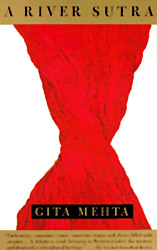A River Sutra by Gita Mehta is an easy and enjoyable book. This book is a welcome tale on each religion interacting with others. This book will definitely pick anyone`s interest in the different subjects and offer the readers into a gateway to many wonderful religious literary and academic traditions. This book namely `A River Sutra` is one of the markable books in the field of religion.
Gita Mehta is a prolific writer in every sense. But she doesn`t consider herself a professional writer. She is a journalist, documentary filmmaker, promoter of the Indian experience, and also a writer. She writes a wide range of nonfiction books as well as novels.Gita Mehta was born in southern India in 1944. Her father was an industrialist, flying ace, and also a politician. Mehta witnessed India`s transition from a jewel in Britain`s crown to a member of the Commonwealth of Nations. Mehta`s childhood was not at all usual one. Gita Mehta was the daughter of Biju Patnaik. She was born barely three weeks before the British carted off her father to jail during India`s struggle for independence. One of her father`s cousins, a nineteen year old poet, had been shot dead on the steps of the Chittagong armory in a bold bid inspired by the Easter uprising in Dublin. When Mehta was nearly three, she went to a boarding school in Kashmir run by nuns. Her mother became active member to the revolutionary movement, and was busy trying to get her father out of jail. It was into this unique family setting that Mehta was born, at an occasion in India`s evolution, which energized people with the dream of what India could be. Mehta`s father, who had been a leading industrialist in India, abandoned his business interests to devote himself to politics. Her writing career gets strength when she gets married to her fellow student Ajai Singh Mehta while attending Cambridge University.
 Synopsis:
Synopsis:
A River Sutra is the third book by Gita Mehta. A gentle side comes through the novel that leaves the reader feeling deeply for the characters she has created. The author employs a lyricism that is unexpected. The river is the Narmada, one of the holiest in India; and, a sutra is both a thread, and a discourse that constantly unwinds. This appropriately named book can be described, as a study of love, and another look at India sometimes fanciful, sometimes frightening, but always warm-hearted. Mehta tells the story of a retired government official who resides on one of the largest and holiest rivers in India. In his working days the official was never a religious man, but now that he has a chance to relax and observe his surroundings, he is able to take in the diversity around him and start his own questioning about the spiritual side of life. Using this frame, Mehta illustrates the official`s encounters with numerous characters who, each in turn, tell their stories to the retired official. As the story proceeds he encounters many characters as for example a Jain mendicant, a Muslim music teacher, a wandering ascetic, a courtesan seeking her kidnapped daughter, a genius sitar player, and a tea plantation official who has encountered Nagas. Mehta uses each character to explore different religious themes that are represented in India and weaves them all into a cohesive search for spiritual truth. India is always a country of unity in diversity and the author has successfully uses this trait.













